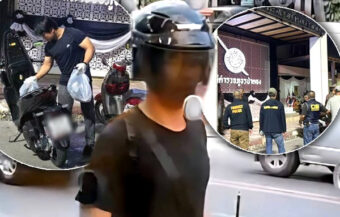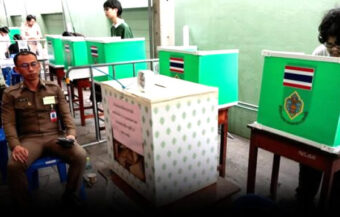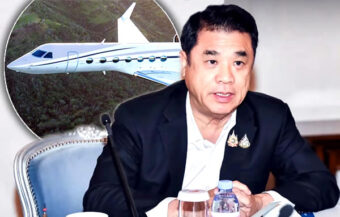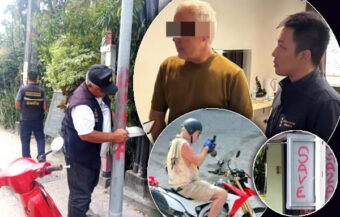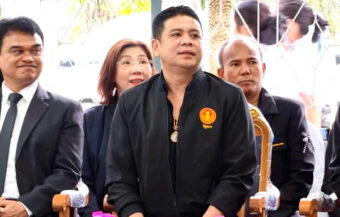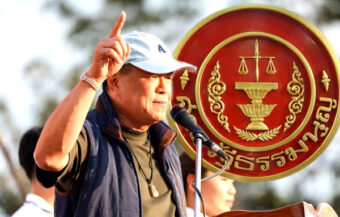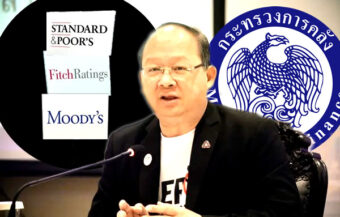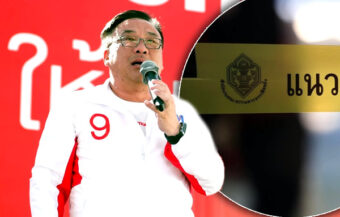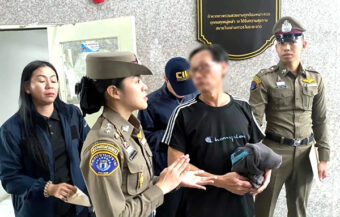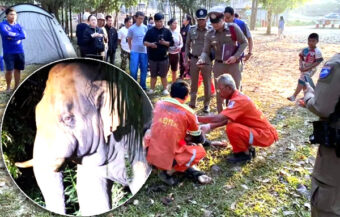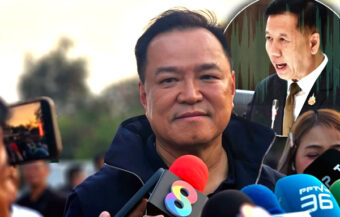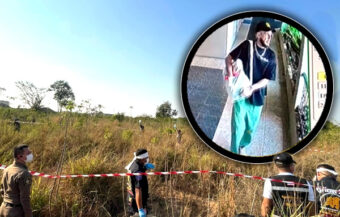Prime Minister Anutin Charnvirakul retreats from his hardline stance, reaffirming his pact with the People’s Party to push constitutional reform, hold a national referendum and call early elections — as pressure mounts from opposition and a no-confidence vote looms.
Prime Minister Anutin Charnvirakul on Friday backed down from his hardline stance over a possible No Confidence Motion, just days after warning he would not let his government be “attacked for free.” He ruled out dissolving the House of Representatives and reaffirmed his September deal with the People’s Party to pass a constitutional amendment, hold a referendum, and call an election to return power to the people. The sudden shift contrasts sharply with his earlier defiance, and with tensions rising, Thailand now looks just months away from a fiercely fought election.
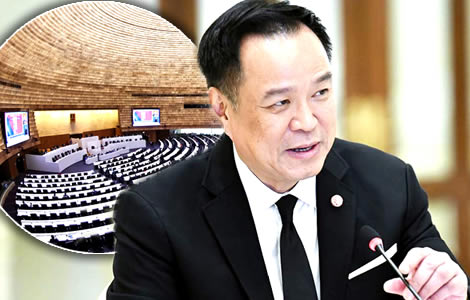
Prime Minister Anutin Charnvirakul has reversed his stance within 48 hours over the threat of a No Confidence Motion. On Wednesday, he warned that he would not allow his government to be “attacked for free.” By Friday, however, he appeared to accept that such a motion may proceed. The abrupt shift followed rising pressure in parliament and from the opposition.
The People’s Party has accused the government of failing to tackle the flow of Cambodian grey capital. It also blames the administration for the spread of scam compounds that target Thailand and damage the country’s reputation abroad.
Opposition firebrands, including Rangsiman Rome MP, have intensified criticism of the government’s performance. They have targeted several ministers, including Deputy Prime Minister Thamanat Prompow, de facto leader of the Kla Tham Party.
Opposition pushes scrutiny as missing ministers deepen crisis and amendment battle gains momentum
Mr. Thamanat, together with other key ministers and one who has since resigned, failed to attend a crucial hearing before the Committee on National Security, Border Affairs, National Strategy, and National Reform. Their absence has deepened friction between the government and opposition benches.
Meanwhile, Mr. Anutin appeared on Friday to accept that a No Confidence motion could now be inevitable. His statement came as parliament prepared for the second reading of a constitutional amendment bill. That reading is expected at the end of November.
The final reading is likely by the end of the next session in December. The amendment aims to pave the way for a new constitution, as pledged in the government’s memorandum of understanding with the People’s Party.
However, opposition leaders from both the Pheu Thai Party and the People’s Party say they want the bill passed before any government collapse. They insist that it would be irresponsible to dissolve the House before the amendment is approved. Despite these assurances, doubts persist about the government’s sincerity. Many critics believe the Bhumjaithai-controlled coalition could block the measure when it reaches the third reading.
Opposition insists Charter law must pass before dissolution as questions mount over coalition’s intent
Either way, political observers expect a general election in early 2026. A tentative date of March 29 has been circulated. The People’s Party plans to frame the vote as a national verdict on corruption and constitutional reform. It argues that the 2017 Constitution distorts democracy and weakens stable government. This, it says, allows corruption to thrive unchecked.
On Friday, Anutin released a detailed statement to clarify his position. He denied rumours of an immediate dissolution of parliament. He said he fully understood that his government was a minority administration.
Furthermore, he confirmed that he would honour all terms under the memorandum of understanding with the People’s Party. He declared he would not “hold the Constitution hostage” under any circumstance.
Anutin also outlined a strict timeline. He confirmed an agreement with the People’s Party to dissolve the House within 120 days of the policy statement. That period expires on January 31, 2026. He said the government’s three key tasks within that window were constitutional amendment, a referendum and dissolution of the House. He stated that all three would be completed on schedule.
Anutin’s 120-day plan to amend constitution, hold referendum, and dissolve parliament by January 31
The prime minister said his administration had limited time to plan beyond four months. Therefore, he focused on four urgent problems: the economy, national security, natural disasters and social issues such as drugs and fraud.
He emphasised that these problems existed before his government took office. “We did not create them,” he said. “We are here to solve them.”
He also referred to the continuing Thai-Cambodian dispute and the widespread scammer networks. He said both issues predated his government. According to him, the administration has acted to dismantle those criminal operations. He linked these problems to wider economic pressures and sluggish domestic activity.
To address economic concerns, Anutin cited stimulus efforts, including the “Half-Half Plus” scheme, the “Travel Good, Get a Rebate” program, and the “Resolving Retail Debt” initiative. He described them as short-term measures to reduce expenses and boost spending. “These are for a healthy body and a comfortable wallet,” he said.
Government focuses on the economy, scams and cross-border issues with short-term stimulus schemes
The prime minister also acknowledged the political risk ahead. He said that if a no-confidence debate was used only for political gain, his government could not survive.
“We are a minority government,” he stated. “If the debate turns into politics, we will consider how to proceed.” He added that an early dissolution would then be possible. However, if the debate sought solutions for the country, he said he was ready to cooperate.
He repeated that the government was prepared to clarify every allegation. “We will not hold the Constitution hostage,” he said. “We will amend it quickly within the agreed timeframe.” Once the amendments and referendum are complete, he said, the House will be dissolved.
Anutin also said he had invited Rangsiman Rome to meet and discuss joint action against scammer operations. “We haven’t met yet because our schedules don’t match,” he said. “But I believe we will meet soon for the benefit of the nation.”
On Wednesday, the prime minister had struck a very different tone. Speaking at the “Thailand’s Next Frontier: A National Economic Vision” forum, he warned that he would not allow his government to be attacked without consequence.
Minority government faces peril as Anutin warns he may dissolve parliament if opposition turns political
He also said that if the opposition tried to provoke a crisis, he could dissolve parliament before January 31. “If it becomes a political game and the government cannot play along, we’ll dissolve the House,” he said. “It’s only a month earlier. It won’t make much difference.”
He reaffirmed that he would keep his promise to the People’s Party. “I have never changed my position,” he told reporters. “Once the four-month period ends, the House will be dissolved.” He said both parties agreed that returning power to the people through elections was the most appropriate course.
He explained that the People’s Party had more MPs but no prime ministerial candidate. Therefore, both sides agreed to follow procedure and restore the mandate to the electorate. He said he would honour that deal completely.
When asked if he was ready for an election, Anutin said yes. He said his Bhumjaithai Party had been preparing since it joined the coalition in 2023. “An election can happen any day,” he said. “If it’s held tomorrow, we must be ready.”
Anutin signals readiness for new election while pledging to honour pact and return power to the electorate
Asked if he would seek another term as prime minister, Anutin replied directly. “Why not? Being prime minister isn’t bad,” he said. “Once in the role, you see what can be done for the country.”
Meanwhile, People’s Party deputy leader Wiroj Lakkhanaadisorn said the decision to dissolve the House rests solely with the prime minister. He said his party would not obstruct the constitutional amendment. “At the very least, we have tried,” he said. “This constitution has fundamental problems.”
Prime Minister Anutin considering early dissolution of the House as no confidence vote chance rises
PM Anutin tells Anti Money Laundering Office to act decisively on scammer funds to prevent sanctions
As tension builds, both government and opposition now appear to be holding their ground. Parliament is expected to debate the amendment bill at the end of November. By December, the third reading could decide its fate. Until then, political uncertainty continues to mount. The government faces criticism over scams, cross-border money, and ministerial absences. The opposition is sharpening its campaign on corruption and constitutional change.
If Anutin keeps his word, Thailand will head to the polls by late March 2026. But if parliament descends into confrontation, dissolution could come sooner. Either way, the countdown has begun to an electoral battle.
Join the Thai News forum, follow Thai Examiner on Facebook here
Receive all our stories as they come out on Telegram here
Follow Thai Examiner here
Further reading:
Prime Minister Anutin considering early dissolution of the House as no confidence vote chance rises
Shocking intel emerges at parliamentary hearings on Thursday on the Cambodian scam centre crisis
PM Anutin asks the Chinese to produce intelligence on the scammer gangs threatening the country
Prime Minister Anutin Charnvirakul’s government faces new claims of alleged Cambodian scam links
High powered, secretive meeting chaired by PM agrees robust action against Cambodian networks

